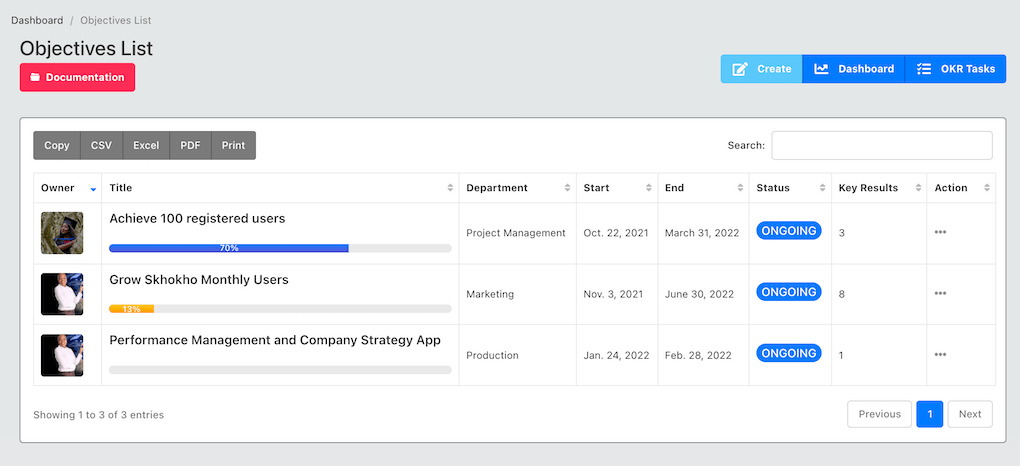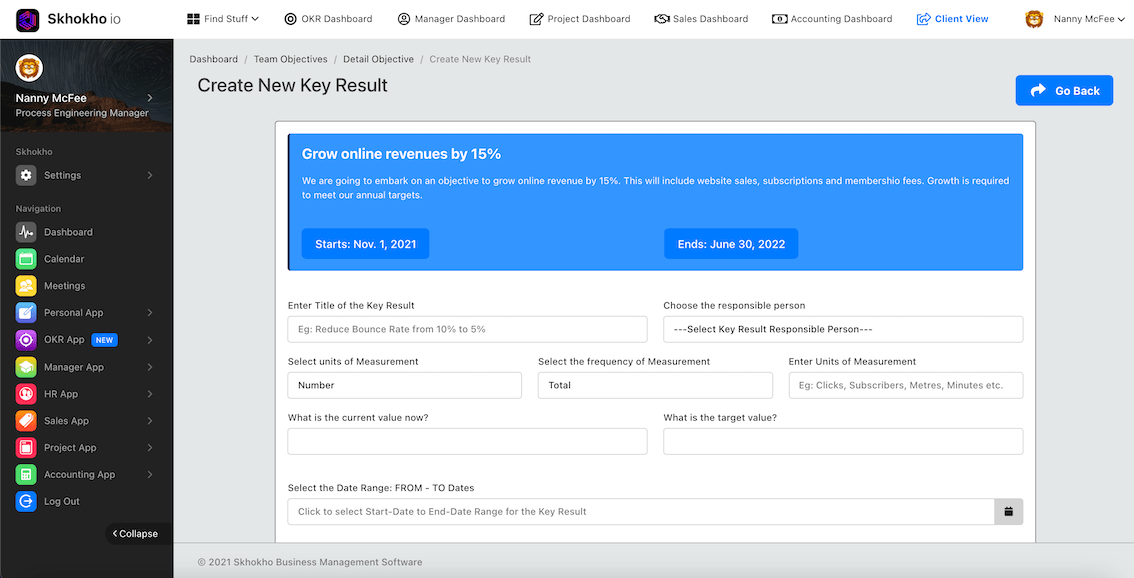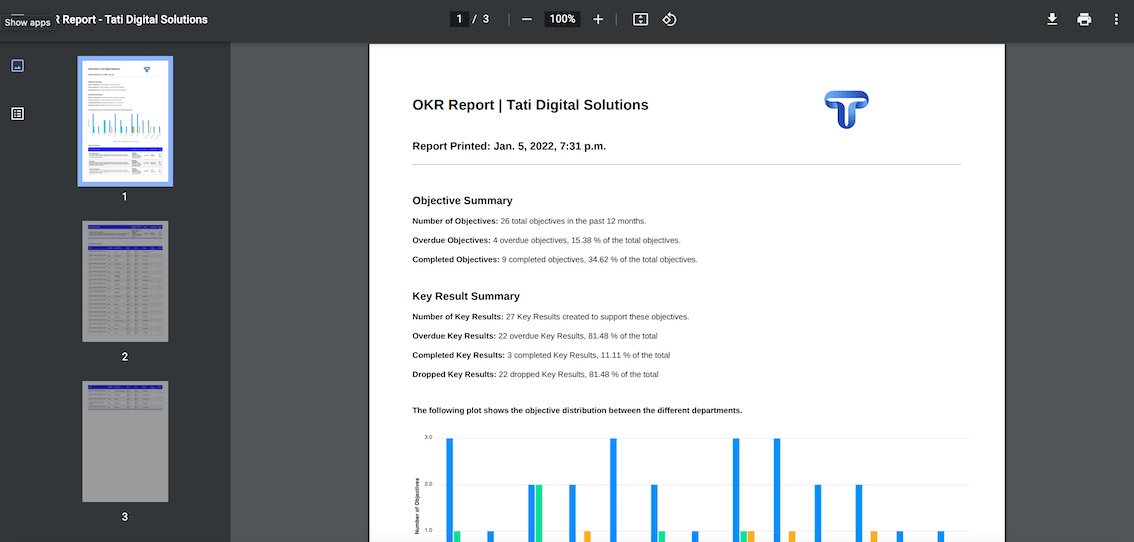How to Develop a Successful Business Strategy Using OKRs in 2023
As a business owner, it is critical to have a clear and structured business strategy in order to achieve success. A well-defined strategy provides a roadmap that outlines your priorities, objectives, and the steps you need to take to get there. Having a clear strategy in place helps you stay focused on your goals and ensures that you are making progress towards your desired outcomes.
To achieve your goals, you need a goal-setting methodology that is both effective and efficient. This is where OKRs (Objectives and Key Results) come in. OKRs are a powerful tool that can help you align your objectives with your overall strategy and track your progress towards your goals.

The benefits of using OKRs for business strategy are numerous. OKRs provide a clear and structured approach to goal setting that ensures that your objectives are well-defined and achievable. They also help to align the efforts of the entire organization towards a common goal, ensuring that everyone is working together to achieve the same outcomes.
With Skhokho, you can set, manage, and measure your OKRs in a centralized location, making it easier to track your progress and make adjustments as needed. Skhokho provides a range of features and tools that can help you to manage your business more effectively, including project management, task management, and collaboration tools.
In this blog, we will discuss how to develop a successful business strategy using OKRs in 2023. We will provide a step-by-step guide to setting up your OKRs, introduce you to the benefits of using OKRs for goal setting, and show you how Skhokho can help you achieve your 2023 business goals.
Understanding OKRs
OKRs are a goal-setting methodology that helps businesses align their objectives with their overall strategy. The structure of an OKR consists of two parts: an Objective and Key Results. An Objective is a clear and concise statement that defines what you want to achieve, while Key Results are specific, measurable, and time-bound outcomes that demonstrate how you will achieve your Objective.
One of the benefits of using OKRs is that they provide a clear and structured approach to goal setting. By defining Objectives and Key Results, businesses can stay focused on their priorities and track their progress towards achieving their goals. Additionally, OKRs help to align the efforts of the entire organization towards a common goal.

Common misconceptions about OKRs include the belief that they are too rigid or that they are only suitable for large organizations. However, OKRs can be adapted to suit the needs of any size business and can provide a flexible framework for goal setting and progress tracking.
Steps to Develop a Successful Business Strategy with OKRs
XYZ Startup is a dynamic and innovative technology company that specializes in developing software solutions for small businesses. With a team of experienced professionals and a passion for empowering small businesses with cutting-edge technology, XYZ Startup is poised to make a significant impact in the market.
In this section, we will follow the journey of XYZ Startup as they go through the steps to develop a successful business strategy using OKRs (Objectives and Key Results) in 2023. We will see how the company defines their mission and values, conducts a SWOT analysis, identifies their top priorities, sets SMART Objectives, assigns Key Results, and assigns ownership and timelines to each Objective and Key Result. This will provide a concrete example of how a company can use OKRs to develop a successful business strategy and achieve their goals.
Step 1: Define your company's mission and values
Before setting your goals for 2023, it's important to have a clear understanding of your company's mission and values. This will help you to align your objectives with the overall direction of your business and ensure that your goals are in line with your company's purpose.

Company XYZ Example
Mission: To empower small businesses with cutting-edge technology and simplify their operations, allowing them to focus on what they do best.
Values: Innovation, Simplicity, Empowerment, Customer-Centricity
Step 2: Conduct a SWOT analysis to identify strengths, weaknesses, opportunities, and threats
A SWOT analysis is a tool used to identify the internal and external factors that may impact your business. By conducting a SWOT analysis, you can gain a better understanding of the challenges and opportunities you may face in the coming year and adjust your strategy accordingly.
Company XYZ Example
XYZ Startup has conducted a SWOT analysis and has identified the following:
Strengths: Experienced team with a strong background in technology, innovative products, strong customer support.
Weaknesses: Limited brand recognition, limited marketing budget, limited experience in selling to small businesses.
Opportunities: Growing demand for technology solutions in the small business market, increasing competition in the market, new partnerships and collaborations.
Threats: Economic downturn, increasing competition, new entrants in the market.
Step 3: Identify your company's top priorities for 2023
Based on the results of your SWOT analysis, identify your company's top priorities for 2023. These should be the areas of focus that will have the greatest impact on your business and help you to achieve your overall objectives.

Company XYZ Example
Based on the results of their SWOT analysis, XYZ Startup has identified the following as their top priorities for 2023:
- Increase brand recognition and awareness among small businesses
- Expand their customer base by targeting new markets
- Improve customer satisfaction and support
Step 4: Set SMART Objectives for each priority
For each priority, set SMART Objectives. SMART Objectives are Specific, Measurable, Achievable, Relevant, and Time-bound. By setting SMART Objectives, you can ensure that your goals are well-defined and achievable.
Company XYZ Example
XYZ Startup sets the following SMART Objectives for each priority:
Increase brand recognition and awareness among small businesses
Objective: To increase brand recognition among small businesses by 50% by the end of 2023
Key Results:
1. Increase website traffic by 50%
2. Participate in 10 industry events and conferences
3. Launch a referral program for existing customers
Expand their customer base by targeting new markets
Objective: To enter 3 new markets and acquire 100 new customers in each market by the end of 2023
Key Results:
1. Conduct market research to identify potential new markets
2. Develop a targeted marketing campaign for each new market
3. Launch a new product in each new market

Improve customer satisfaction and support
Objective: To improve customer satisfaction by 25% by the end of 2023
Key Results:
1. Implement a customer feedback system
2. Provide regular training for customer support staff
3. Respond to all customer inquiries within 24 hours
Step 5: Assign Key Results to each Objective
For each Objective, assign Key Results. Key Results should be specific, measurable, and time-bound outcomes that demonstrate how you will achieve your Objective.
Company XYZ Example
Example Company: XYZ Startup assigns Key Results to each Objective as outlined above.
Step 6: Assign Ownership and Timelines to each Objective and Key Result
Finally, assign ownership and timelines to each Objective and Key Result. This will ensure that each goal is being tracked and that progress is being made towards achieving your overall strategy.
Company XYZ Example
Example Company: XYZ Startup assigns ownership and timelines to each Objective and Key Result. For example, the objective "To increase brand recognition among small businesses by 50% by the end of 2023" is assigned to the marketing team with a deadline of December 31st, 2023. The Key Results associated with this Objective are also assigned to the marketing team with specific deadlines for each Key Result.
Using Skhokho OKR Management System
Skhokho is a business management software that has an OKR management system. The Skhokho OKR management system allows businesses to set, manage, and measure their OKRs in a centralized location. With Skhokho, you can track your progress towards your goals and make adjustments as needed, ensuring that you stay on track and achieve your objectives.
The Skhokho OKR management system is easy to use and provides a step-by-step guide to setting up your OKRs. Simply log into the Skhokho platform, create your Objectives and Key Results, and assign ownership and timelines. The Skhokho platform will automatically track your progress and provide regular updates on your progress towards your goals.
In addition to tracking progress, Skhokho also provides a range of features and tools that can help you to manage your business more effectively. These include project management, task management, and collaboration tools that allow you to work with your team to achieve your goals.
Step One - Enter Objective
Start by Navigating to the OKR App - Objectives list page

Enter the Objectives you have selected for your business:
You will be able to enter:
- Title of the objective
- Responsible person for the objective
- Select - Team or Individual Objective
- Select the business department or business unit
- Select start and end date for the objective
- Description of the objective
Step 2 - Enter Key Results
After entering an objective, enter three to five key results for each objective:

- The title of the key result (use a descriptive, specific and measurable title - eg: complete 10 interviews every month for 6 months).
- Select a responsible person for the Key Result - Note this can be different from the responsible person for the Objective
- Select the Key Result measurement - The options are: (1) Number, (2) Decimal, (3) Currency and (4) Percentage.
- Select the frequency of measurement - The options are: (1) Total, (2) Hourly, (3) Daily, (4) Weekly, (5) Monthly, (6) Quarterly and (7) Annually
- Unit of measurement - This can be anything from kg, people, views to subscriptions. In our example you would enter "interviews" as the unit of measure. Because you are measuring a number of interviews.
- Enter the current value and target value for the Key Result. The Current value in this example would be the number of interviews you are currently doing and the target would be 10.
- Enter start and end dates
- Write a description for your Key Result
Step 3 - Regular Monitoring and Maintenance of the OKRs using Skhokho
Once you have entered your Objectives and Key Results into the Skhokho OKR system, it's important to regularly monitor your progress and make any necessary adjustments. Regular monitoring of your OKRs ensures that you stay on track and achieve your goals, and is a proactive approach to goal-setting compared to traditional KPIs, which often only measure progress at the end of a period.
A good practice is to set up weekly meetings with your team to discuss the progress of your OKRs. During these meetings, you can review the current progress, discuss what worked well in the past week, and make plans for the next week to move closer to your targets. Skhokho provides PDF reports of your OKRs that you can print out to aid in your meetings, making it easier to track progress and stay on top of your goals.

By using Skhokho to regularly monitor and maintain your OKRs, you can stay focused on your priorities and make necessary adjustments as you go. This helps to ensure that you achieve your objectives and reach your goals for 2023 and beyond.
Conclusion
In conclusion, developing a successful business strategy using OKRs in 2023 is essential for the success of any business. By following the steps outlined above, you can set clear and structured goals that align with your overall strategy, and track your progress towards achieving your objectives.
Skhokho is a powerful business management software that provides a range of tools and features to help you achieve your goals, including an OKR management system. By using Skhokho, you can stay focused on your priorities, track your progress, and make adjustments as needed to ensure that you achieve your goals.
In the fast-paced and ever-changing world of business, having a clear and structured strategy is more important than ever. By using OKRs and Skhokho, you can stay ahead of the curve and achieve your goals for 2023 and beyond.









